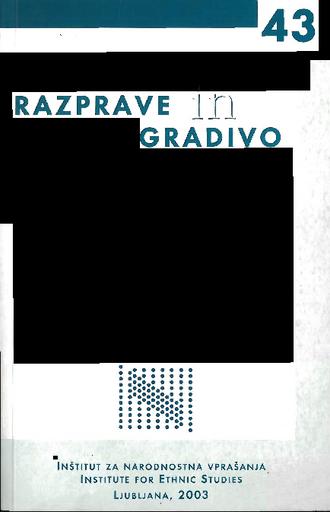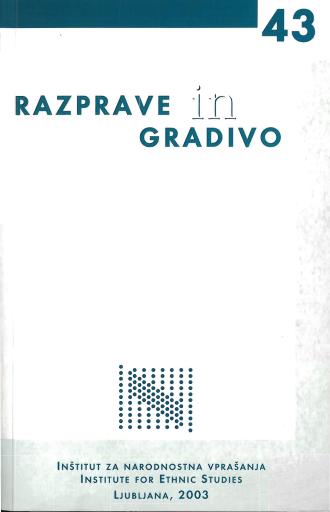
/
Serijske publikacije
/
Razprave in gradivo
The Slovene language in Carinthia – symbolic bilingualism

Avtor(ji):Albert F. Reiterer
Soavtor(ji):Boris Jesih (odg. ur.), Mitja Žagar (gl. ur.)
Leto:2003
Založnik(i):Inštitut za narodnostna vprašanja, Ljubljana
Jezik(i):angleščina
Vrst(e) gradiva:besedilo
Datoteke (1)

Ime:Razprave_in_gradiva-43.pdf
Velikost:15.31MB
Format:application/pdf
Stalna povezava:https://hdl.handle.net/11686/file465
Opis
Vprašanja o "pogovornem jeziku" so del vsakega avstrijskega popisa prebivalstva po drugi svetovni vojni oziroma vse od štetja 1880 v Cisleithanii. Zadnji popis iz 2001 je pokazal, da 12.600 Avstrijcev na Koroškem "priznava", da govorijo slovensko. Kot je v strokovni javnosti znano,popisni termin "pogovorni jezik" ne označuje jezikovnega znanja oziroma vsakdanje rabe jezika, pač pa pripravljenost etnične (politične) identifikacije s slovensko manjšino (za primerjavo lahko vzamemo mikroštetje, ki ga je avtor izvedel septembra 1999, in je pokazalo, da okrog 60.000 oseb v starosti 15 let ali več govori oziroma razume slovensko). Članek podrobneje obravnava rezultate tega pregleda in osvetljuje kontekste rabe slovenščine na Koroškem. Razpravlja o razliki med obema rezultatoma in se sprašuje, kaj pomeni v popisni poli označiti slovenščino kot svoj jezik. Avtor ugotavlja, daje dvojezičnost v Avstriji, ne le pri Slovencih, temveč tudi pri Hrvatih in Madžarih, vedno bolj simbolična.
Metapodatki (11)
- identifikatorhttps://hdl.handle.net/11686/4926
- naslov
- The Slovene language in Carinthia – symbolic bilingualism
- Slovenščina na Koroškem – simbolična dvojezičnost
- avtor
- Albert F. Reiterer
- soavtor
- Boris Jesih (odg. ur.)
- Mitja Žagar (gl. ur.)
- predmet
- koroški Slovenci
- bilingvizem
- popisi prebivalstva
- slovenščina
- Koroška
- population censuses
- Austrian Carinthia
- Slovene language
- opis
- Questions for the "colloquial language" are put at every census in Austria since World War II, and in fact since the census of 1880 in Cisleithania. The last one of the year 2001 resulted in about 12.600 Austrians (respectively 14.000 inhabitants) in Carinthia "confessing" - this is the term used most often - to speak Slovene. However, as it is well known to all experts, the census term of "colloquial language" is understood in a way other then indicating linguistic skills or everyday use of the language, that is, signifying the readiness to identify ethnically (politically) with the Slovene minority. This is demonstrated best by comparing the numbers of the census with an investigation looking exclusively for linguistic skills. A representative survey in annex to a micro-census and lead by the author in September 1999 resulted in about 60.000 persons aged 15 years or more speaking or understanding Slovene. The following presentation gives some of the results of this survey in more detail, and it gives some hints at the contexts in which Slovene in Carinthia is spoken, according to this investigation. It discusses the difference between the two numbers and ask for the meaning of ticking in "Slovene" in the census questionnaire, in contrast to the everyday use or the capability to understand the minority language. Following the concept of symbolic ethnicity, coined by H. J. Gans (1979) and tested empirically by R. D. Alba (1990) for the U.S.A., it is argued that bilingualism in Austria - not only with the Slovenes, but with the Burgenland-Croats and the Magyars, too - gets always more a symbolic and less a pragmatic value for the members of the respective linguistic minorities in this country. To the term of symbolic ethnicity the term of symbolic bilingualism has to be added. Supposedly, this loss of structural value while maintaining an identitarian value of the most used indicator for ethnic affiliation in West and Central Europe is the course of post-modern ethnicity in Western Europe and in politically highly developed countries, at least, if the concerned are minority groups.
- Vprašanja o "pogovornem jeziku" so del vsakega avstrijskega popisa prebivalstva po drugi svetovni vojni oziroma vse od štetja 1880 v Cisleithanii. Zadnji popis iz 2001 je pokazal, da 12.600 Avstrijcev na Koroškem "priznava", da govorijo slovensko. Kot je v strokovni javnosti znano,popisni termin "pogovorni jezik" ne označuje jezikovnega znanja oziroma vsakdanje rabe jezika, pač pa pripravljenost etnične (politične) identifikacije s slovensko manjšino (za primerjavo lahko vzamemo mikroštetje, ki ga je avtor izvedel septembra 1999, in je pokazalo, da okrog 60.000 oseb v starosti 15 let ali več govori oziroma razume slovensko). Članek podrobneje obravnava rezultate tega pregleda in osvetljuje kontekste rabe slovenščine na Koroškem. Razpravlja o razliki med obema rezultatoma in se sprašuje, kaj pomeni v popisni poli označiti slovenščino kot svoj jezik. Avtor ugotavlja, daje dvojezičnost v Avstriji, ne le pri Slovencih, temveč tudi pri Hrvatih in Madžarih, vedno bolj simbolična.
- založnik
- Inštitut za narodnostna vprašanja
- datum
- 2003
- tip
- besedilo
- jezik
- Angleščina
- jeDelOd
Seznam literature v delu (34)
| Stran | Avtor | Naslov | Vir | Kraj | Založba | Leto |
|---|---|---|---|---|---|---|
| 199 | Alba, Richard D. | Ethnic identity. The transformation of white America | New Haven | Yale University Press | 1990 | |
| 199 | Anderson, Michael | Children in-between: constructing identities in the bicultural family | J. of the Royal Anthr. Institute | 1999 | ||
| 199 | Banks, Marcus | Ethnicity: anthropological constructions | London, New York | Routledge | 1996 | |
| 199 | Barker, Thomas | The Slovene minority of Carinthia : With the collaboration of A. Moritsch | Boulder | East European Monographs | 1984 | |
| 199 | Brix, Emil | Die Umgangssprachen in Altösterreich zwischen Agitation und Assimilation. Die Sprachenstatistik in den ciselithanischen Volkszählungen 1880-1910 | Wien | Böhlau | 1982 | |
| 199 | Czoernig Karl, von | Ethnographie der österreichischen Monarchie | Wien | Staatsdruckerei | ||
| 199 | Fußmann, Heinz ; Münz Rainer, et al | Sprachgruppen und Sprachkenntnisse im Burgenland | ÖZP | 1991 | ||
| 199 | Fishman, Joshua | Language and nationalism. Two integrative essays | Rowley, Ma | Newbury House | 1972 | |
| 199 | Fishman, Joshua | Language and ethnicity | Language, ethnicity and intergroup relations | London, New York | Academic Press | 1977 |
| 199 | Flaschberger, Ludwig ; Reiterer, Albert F. | Der Tägliche Abwehrkampf. Erscheinungsformen und Strategien der Assimilation bei den Kärntner Slowenen | Wien | Braumüller | 1980 | |
| 199 | Fleissner Monika, Anna | Empirische Analyse des Mehrheit-Minderheiten-problems : master thesis | Klagenfurt | Universität Klagenfurt | 1998 | |
| 199 | Gamerith, Werner | Ethnizität und ihr zeotlich-räumlicher Wandel anhand von Volkszählungsergebnissen. Das Beispiel der Kärntner Slowenen | Klagenfurter Geographische Schriften | Klagenfurt | Institut für die Geographie an der Universität | 1994 |
| 199 | Gans, Herbert J. | Symbolic ethnicity: The future of ethnic group and cultures in America | Ethnic and racial studies | 1979 | ||
| 200 | Grin, François | Economics | Handbook of language and ethnic identity | Oxford, New York | Oxford University Press | 1999 |
| 200 | Hall, Stuart | Old and new identities, Old and new ethnicities | Culture, globalization and the world system. Contemporary conditions for the representation of identities | Minneapolis | University of Minnesota Press | 1998 |
| 200 | Holzer, Werner ; Münz, Rainer | Landessprachen: Deitsch, Kroatisch und Ungarisch im Burgenland | Trendwende? Sprache und Ethnizität im Burgenland | Wien | Passagen Verlag | 1993 |
| 200 | Horowitz, Donald B. | Ethnic groups in conflict | Berkeley | University of California Press | 1984 | |
| 200 | Köllo, Katalin | Ethnische Minderheiten in der Gemeinde. Inetraktion und Kommunikation zwischen Gemeinde und Volksgruppe, dargestellt an Hand zweier Gemeinden im Burgenland : Manus Master Thesis | Spittal a. d. D. | 2003 | ||
| 200 | Mathews, Gordon | Global culture / Individual Identity. Searching for home in the cultural supermarket | London | Routledge | 2000 | |
| 200 | Maurere Lausegger, Herta | Situationally motivated speaking habits among Caribnthian Slovenes | Slovene studies | 1993 | ||
| 200 | Priestly Tom, M. S. | Cultural consciousness and political nationalsim: Language choice among Slovenes in Carinthia (Austria) | CRSN | 1989 | ||
| 200 | Priestly, Tom | The Slovene minority population in Carinthia and Styria in 1927: Some new data | ÖOH | 1997 | ||
| 200 | Priestly, Tom | The position of the Slovenes in Austria : Recent developments in political (and other) attitudes | Nationalities papers | 1999 | ||
| 200 | Reiterer, Albert F. | Zur ökonomischen Situation der slowenischen Minderheit im gemischtsprachingen Gebiet Kärntens | Raumplanungsgesprach Südkärnten | Wien, Klagenfurt | Slowenisches wissenschaftliches Institut | 1977 |
| 201 | Reiterer, Albert F. | Wandel der Sozialstruktur und nationales Bewußsein bei den Kärntner Slowenen | Skupna Koroška, Volksgruppen problematik 1938-1988 | Klagenfurt | Koordinierungsausschuß der Diözese | 1985 |
| 201 | Reiterer, Albert F. | Doktor und Bauer. Ethnische Struktur und sozialer Wandel | Klagenfurt | Drava | 1986 | |
| 201 | Reiterer, Albert F. | Kärntens Slowenen zwischen Minderheit und Elite. Aktuelle Tendenzen der ethnischen Arbeitsteilung | Klagenfurt | Drava | 1996 | |
| 201 | Reiterer, Albert F. | Soziale Identität. Ethnizität und sozialer Wandel. Zur entwicklung einer anthropologischen Struktur | Frankfurt/Main | P. Lang | 1998 | |
| 201 | Reiterer, Albert F. | Neonativism as linguistic nationalism. Ethnonationalism in the United States: The problem of an "Official Language" | Canadian rev. of studies in nationalism | 1998 | ||
| 201 | Reiterer, Albert F. | Lebenswelt muttersprache. Das Slowenische und seine heutige Wahrnehmung - ein Bericht | Kärntner Jahrbuch für Politik 2000 | 2000 | ||
| 201 | Reiterer, Albert F. ; Flaschberger, Ludwig | Ethnischer Konflikt un Alltag | Frankfurt/Main | Peter Lang | 1999 | |
| 201 | Robak, Fritz | Kroaten im Burgenland | Wien | Europa Verlag | 1984 | |
| 201 | Suppan, Arnold | Die österreichischen Volksgruppen. Tendenzen ihrer gesellschaftlichen Entwicklung im 20. Jahrhundert | Wien | Verlag für Geschichte und Politik | 1983 | |
| 201 | Zavratnik Zimic, Simona | Pogovori s koroškimi Slovenci : o etnični identiteti, slovenščini, dvojezični vzgoji in samopodobi | Celovec | Mohorjeva | 1998 |